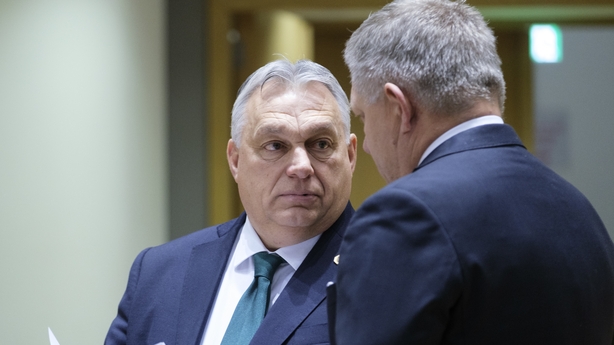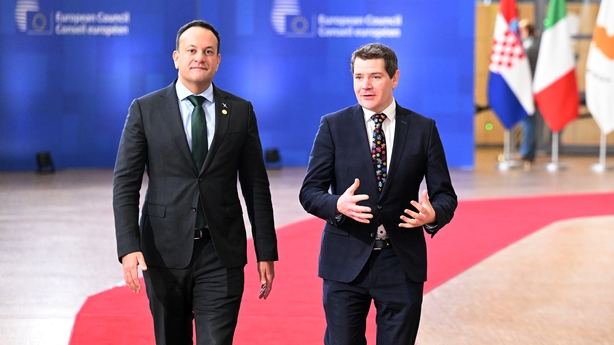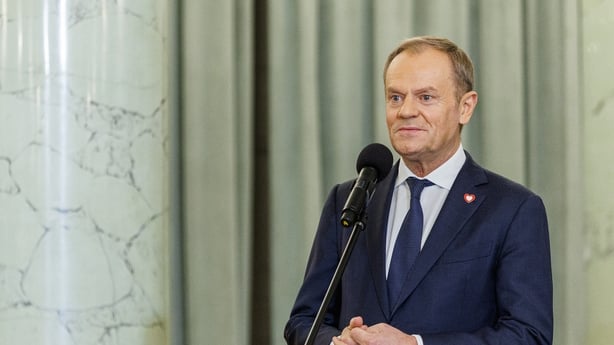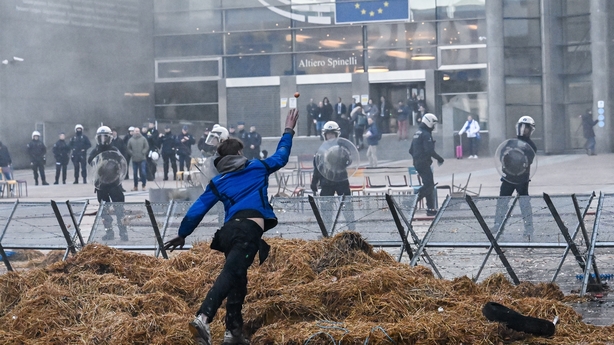Hungary's Prime Minister Viktor Orban has dramatically dropped his objections to €50 billion in EU funding for Ukraine.
The breakthrough was announced as EU leaders were gathering for an emergency summit on the issue.
European Council President Charles Michel, who chairs summit meetings, announced on social media that the deal had been done.
Before the main gathering, Mr Orban held a meeting with the leaders of France, Germany and Italy, as well as Mr Michel and European Commission President Ursula von der Leyen.
Following the meeting, Mr Michel said on X: "All 27 leaders agreed on an additional €50 billion support package for Ukraine within the EU budget.
"This locks in steadfast, long-term, predictable funding for #Ukraine."
Ukrainian President Volodymyr Zelensky hailed the deal and said "it is very important that the decision was made by all 27 leaders, which once again proves strong EU unity".
He also said the package would "strengthen long-term economic and financial stability" of his country.

Ukrainian Prime Minister Denys Shmyhal also welcomed the EU's decision.
"EU Member States one more time show their solidarity and unity in the actions to Ukrainian people to withstand the war," he said on X.
The €50 billion is made up of grants and loans to Ukraine, and will be resourced from an expanded EU budget, known as the Multiannual Financial Framework (MFF).
Ukraine's First Deputy Prime Minister Yulia Svyrydenko told Reuters the government expected this year to receive €18 billion of the €50bn, four-year EU package approved.
The first tranche of €4.5bn is expected in March.
"It is very important for us to maintain macroeconomic stability. It is a prerequisite for economic growth," Ms Svyrydenko, who is also the economy minister, said in an interview.
"Partners' aid is critically important to maintain this stability," she said, adding that she expected the United States to follow the example of the EU.
US President Joe Biden called Ms von der Leyen to thank her for the EU's approval of the aid package for Ukraine, the White House said.
Mr Biden welcomed the "significant financial aid package" which will "go a long way to helping Ukraine as they continue to battle back against Russia's aggression," National Security Council spokesman John Kirby told reporters.
Hungary had sought the right to veto the funding over its four year disbursement period.
According to a copy of the text, EU leaders will debate the funding on an annual basis, without any country having a veto over it.
We have a deal. #Unity
— Charles Michel (@CharlesMichel) February 1, 2024
All 27 leaders agreed on an additional €50 billion support package for Ukraine within the EU budget.
This locks in steadfast, long-term, predictable funding for #Ukraine.
EU is taking leadership & responsibility in support for Ukraine; we know what is…
EU funds for Hungary will remain frozen, regardless of the deal on aid for Ukraine, an EU diplomat said.
The diplomat said Hungary would still need to fulfil its own obligations in order to be eligible to receive EU funds.
Earlier, Taoiseach Leo Varadkar said: "We can't go away without agreement, so one way or another we have to leave here today with an agreement on Ukraine.
"The war is now raging for two years and Ukraine will not be able to continue to defend itself without the support of the European Union," he said.

Hungary's Prime Minister Viktor Mr Orban, who is an ally of Russian president Vladimir Putin, was expected to come under strong pressure from other leaders to agree the funding.
Mr Orban had single-handedly held up €50bn in EU funds designed to give Ukraine a predictable source of income over a four-year period while it fights a brutal Russian invasion.
He dug his heels in during December's summit, so it was decided that leaders would take a break and come back in January, with a solution worked up in the meantime.

"One way or another, we will find some solution, with or without Orban, to support Ukraine," Poland's Prime Minister Donald Tusk said.
The Hungarian leader struck a combative note as he arrived in Brussels yesterday evening, posting a photo of himself with the caption: "We Saddle Up!"
Since the start of Russia's invasion on 24 February 2022, Kyiv has received about $73.6bn in international financial aid, including $27.5bn from the European Union.

Additional reporting Reuters






